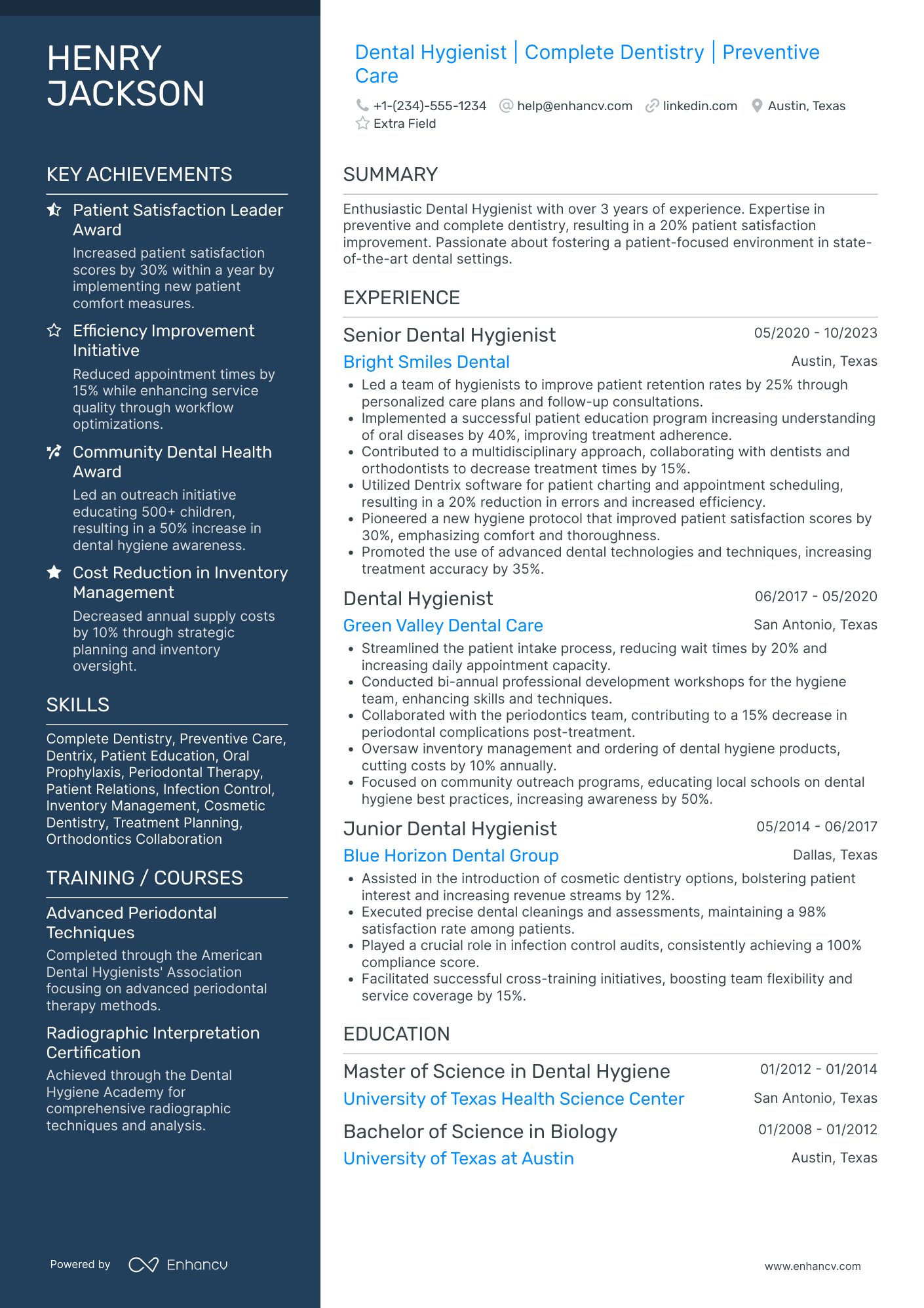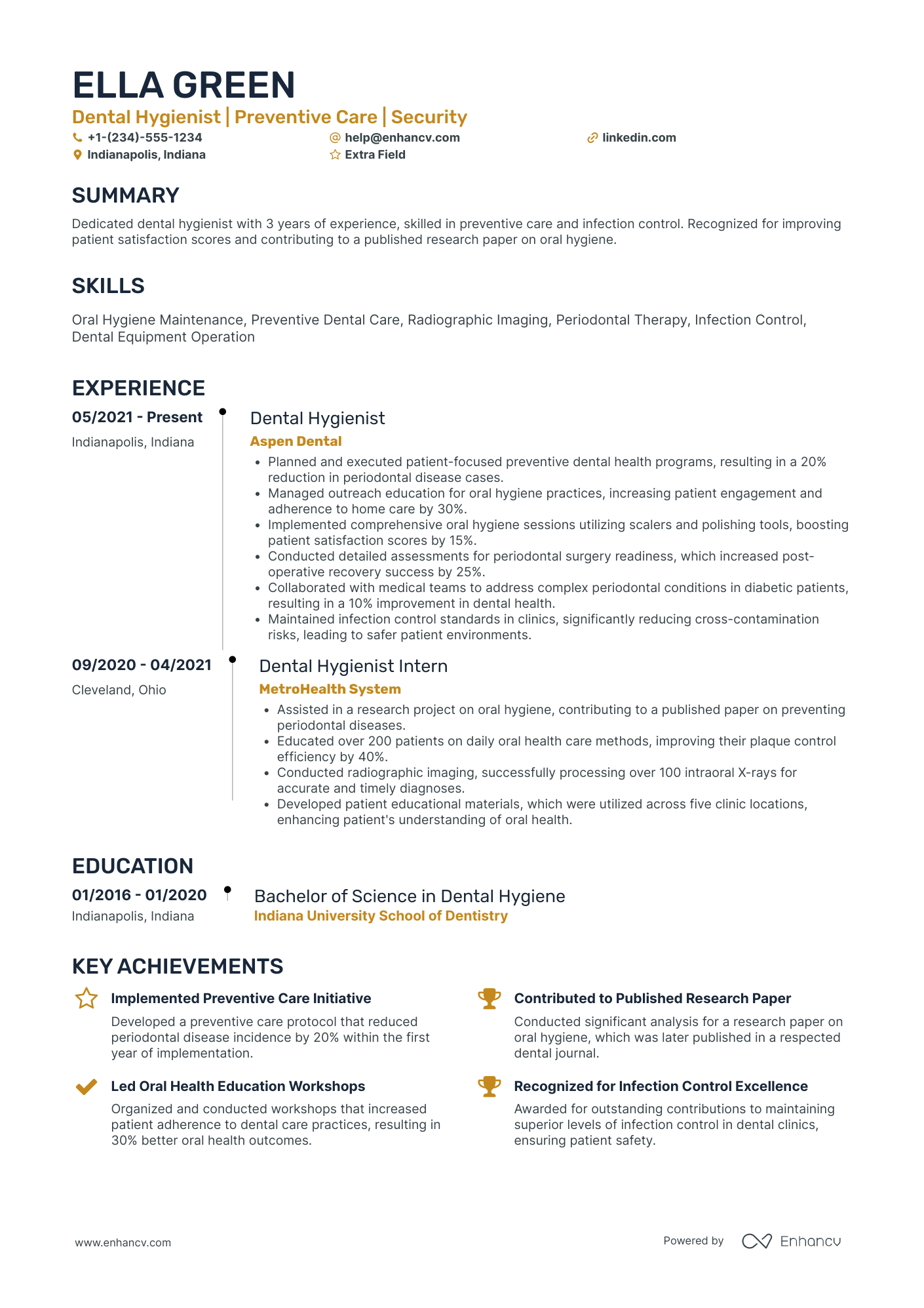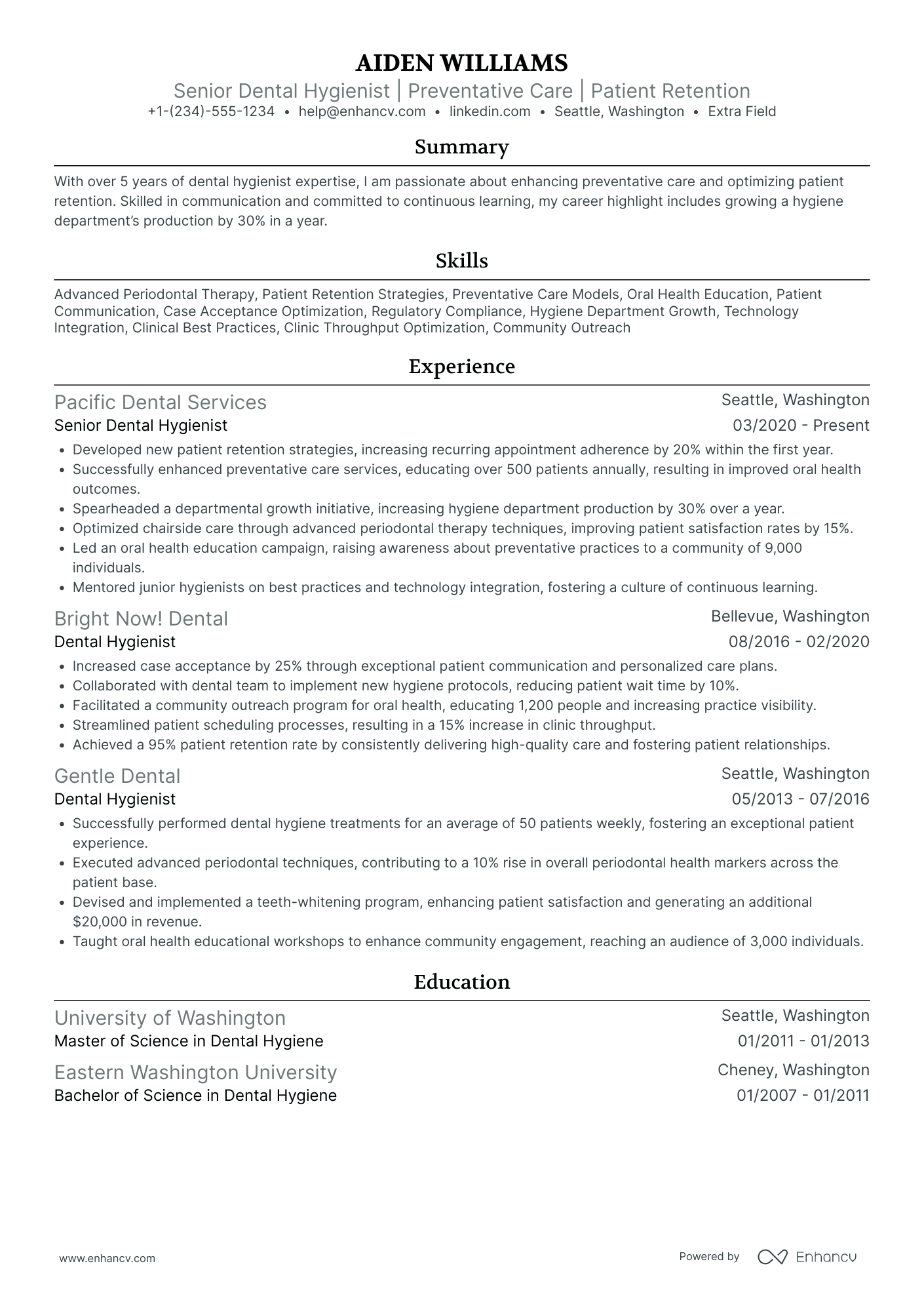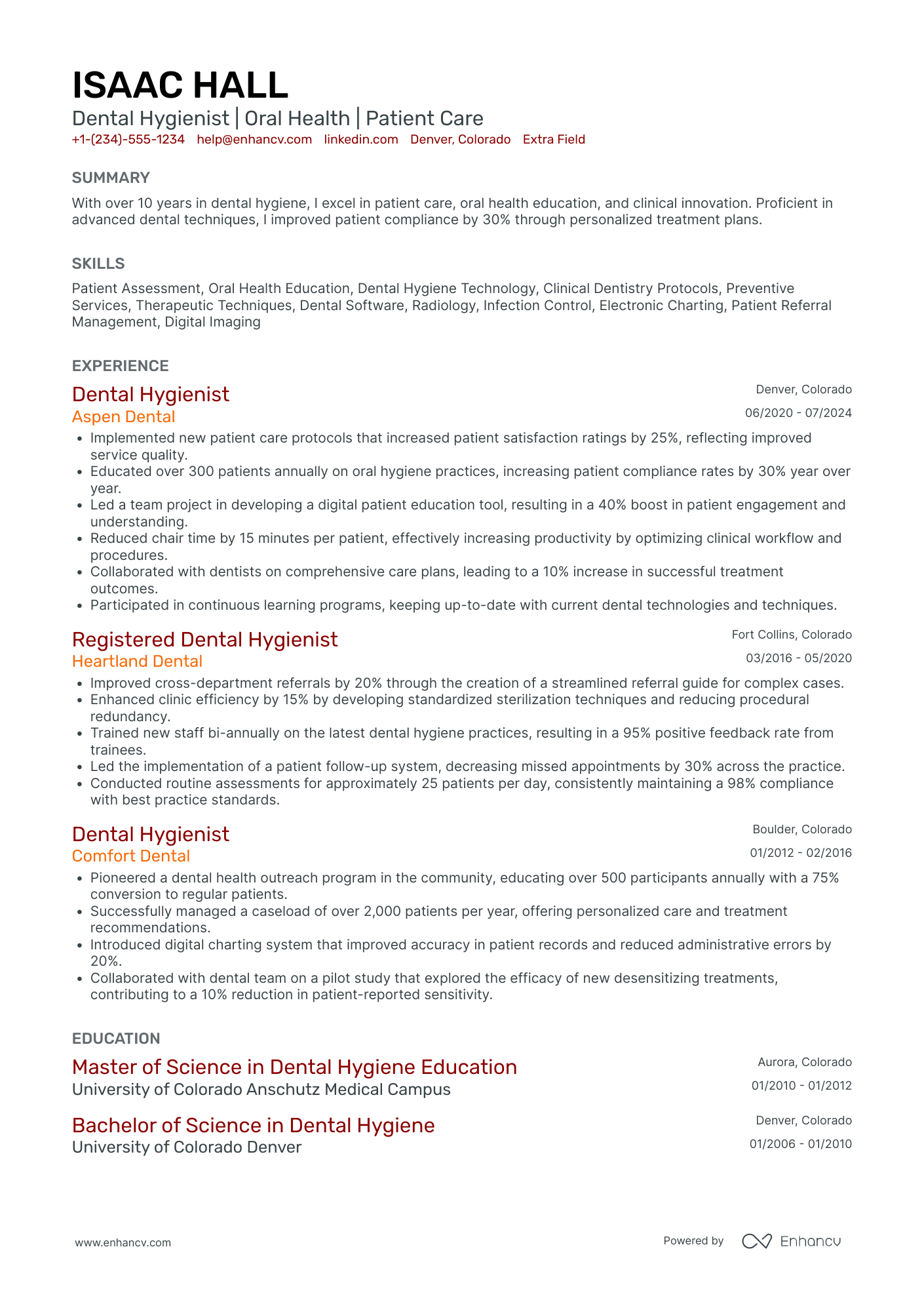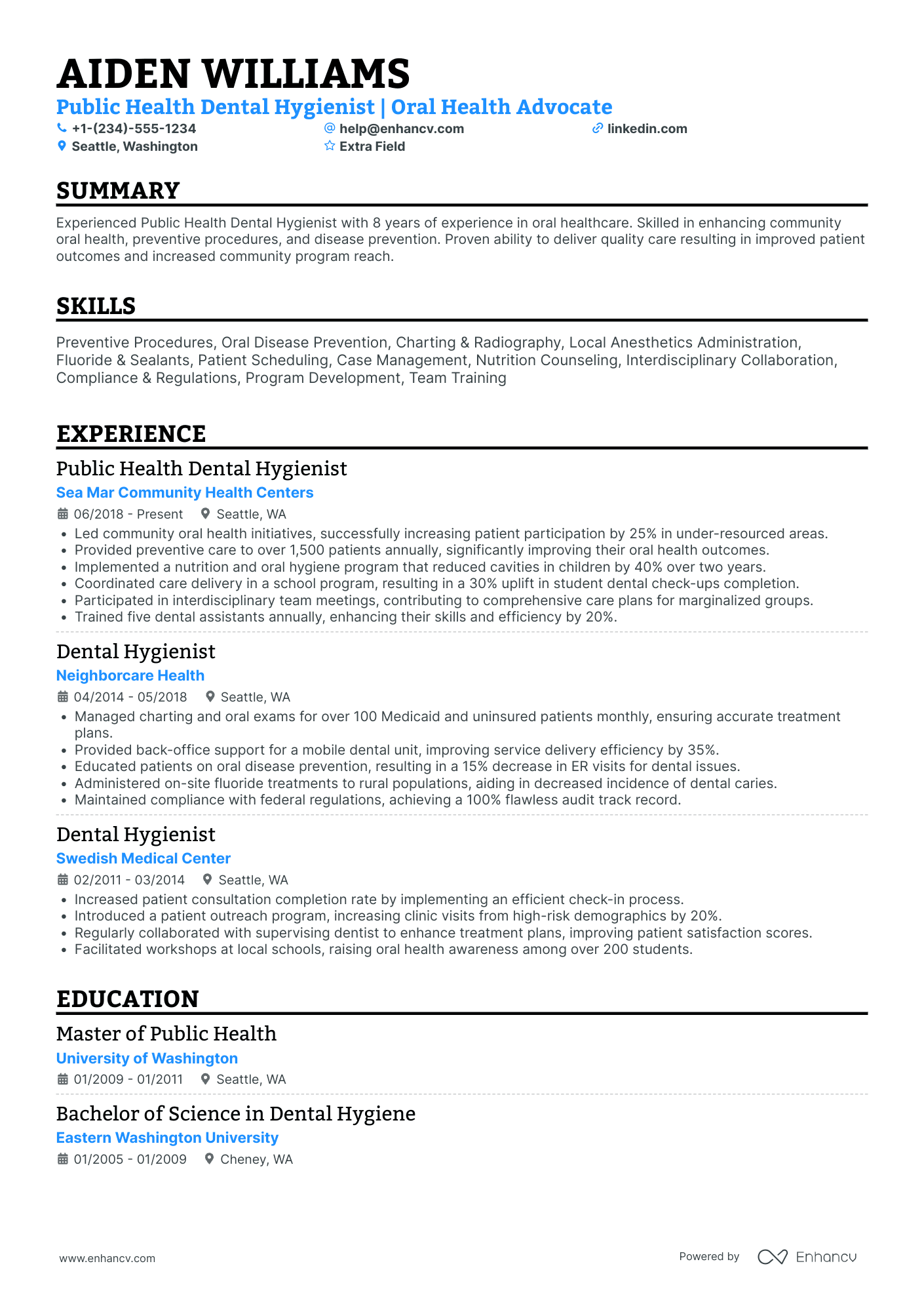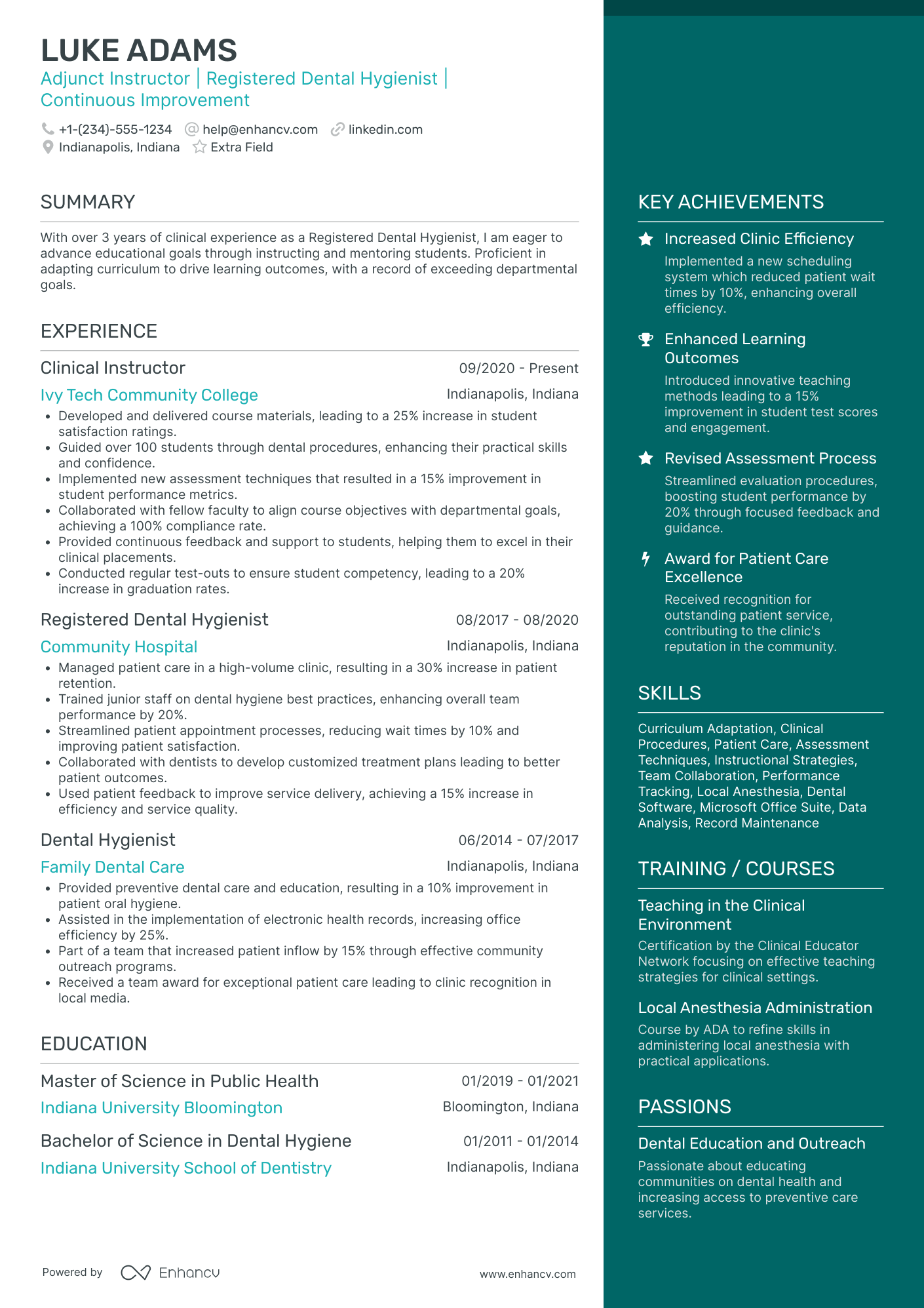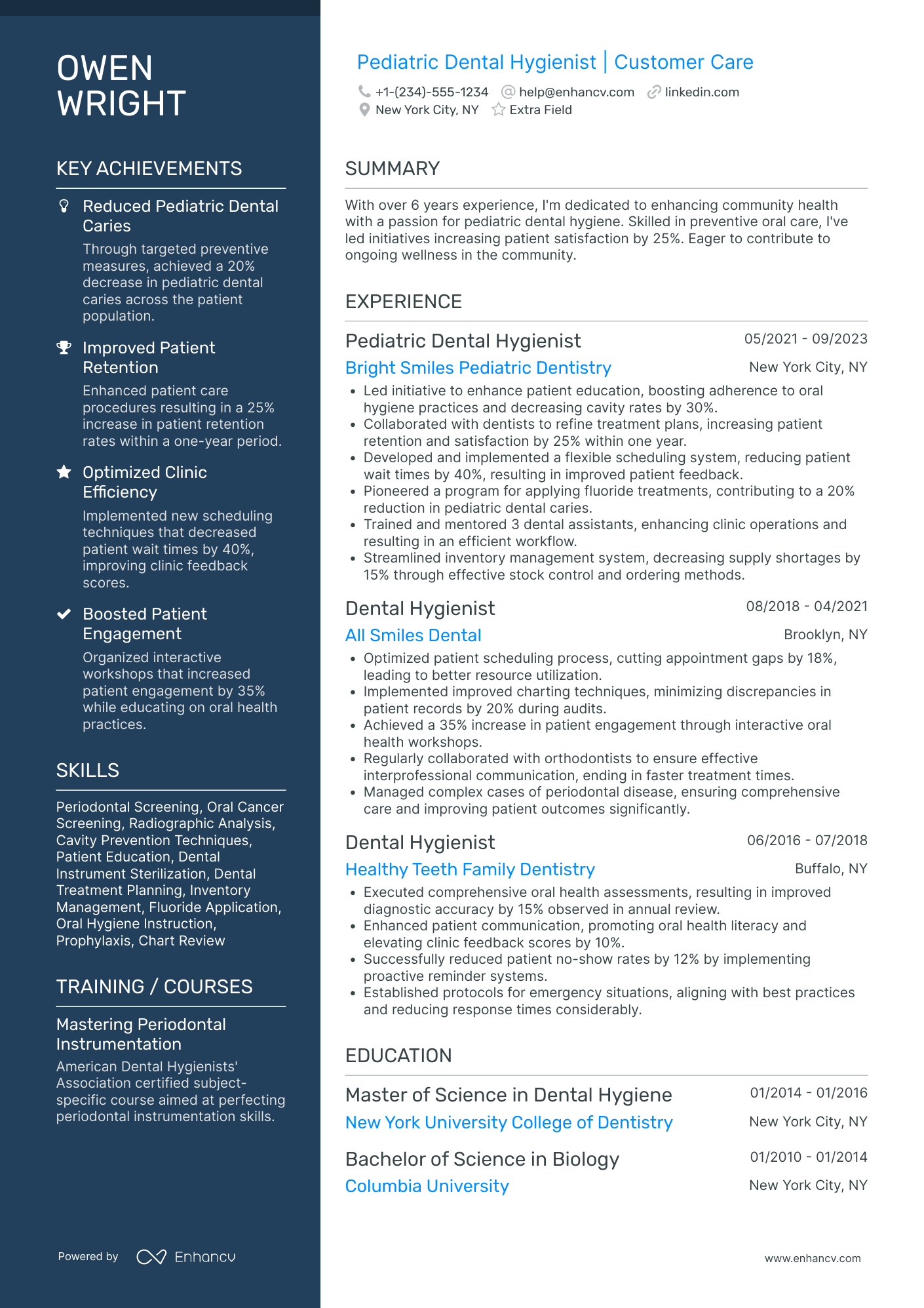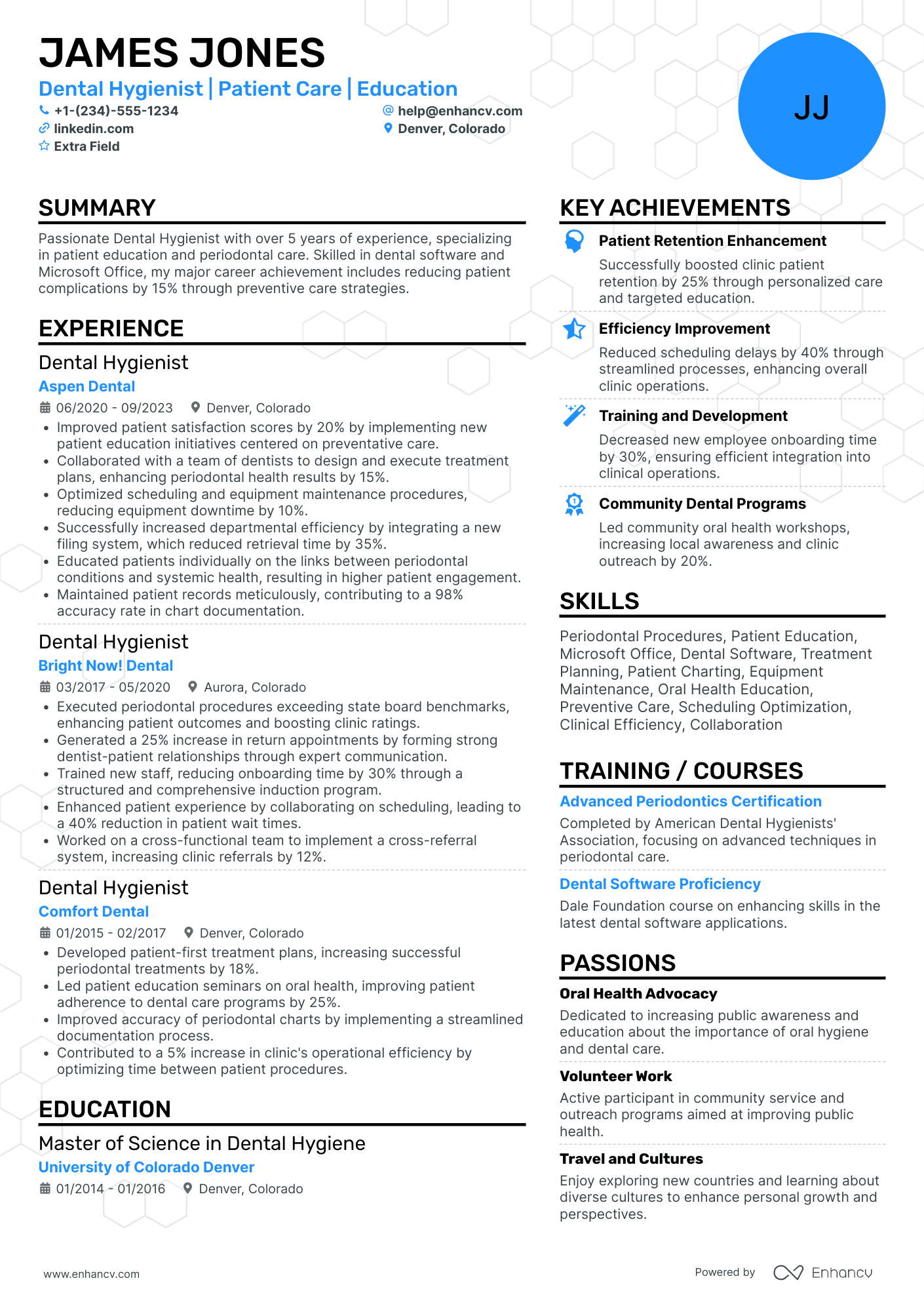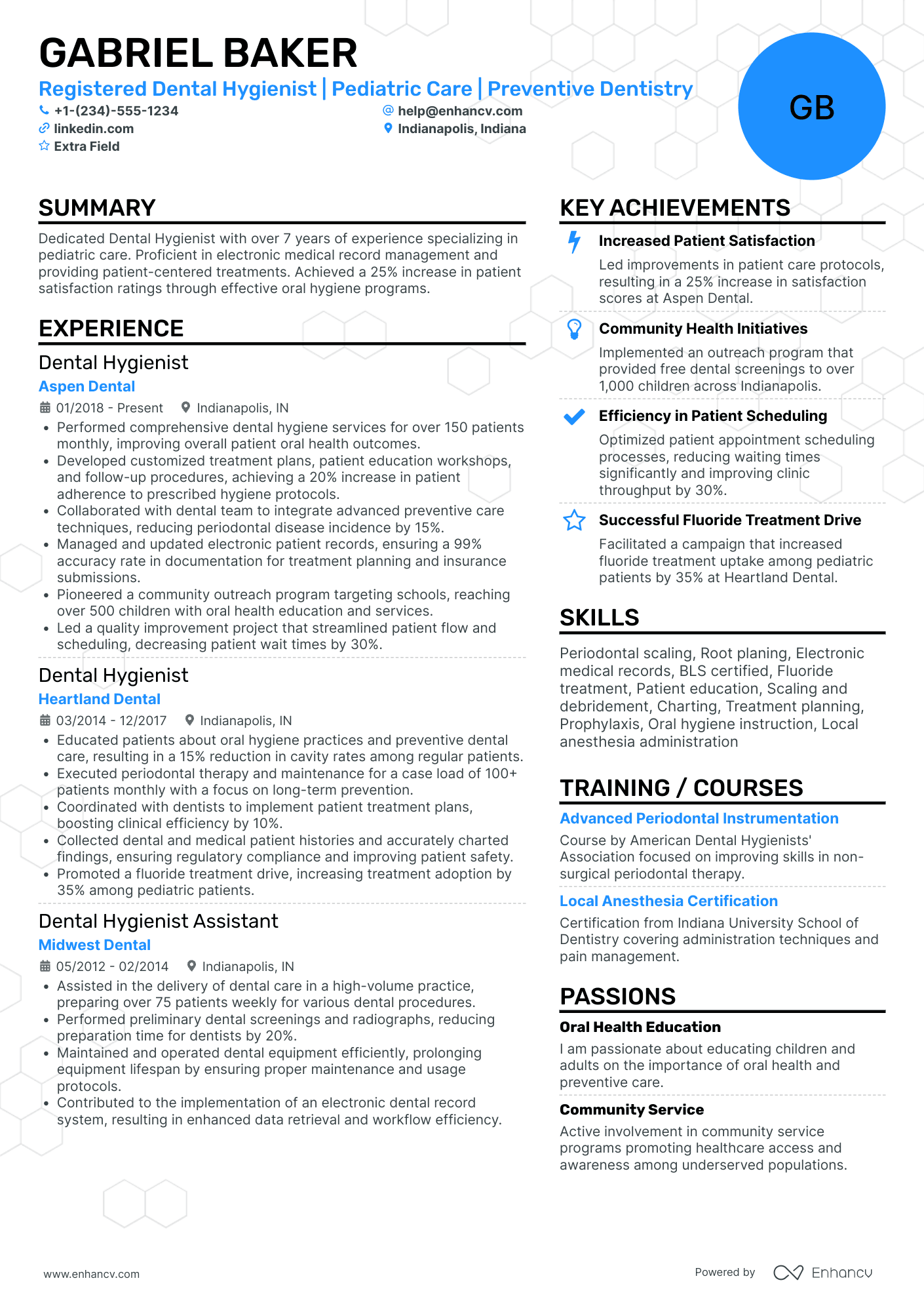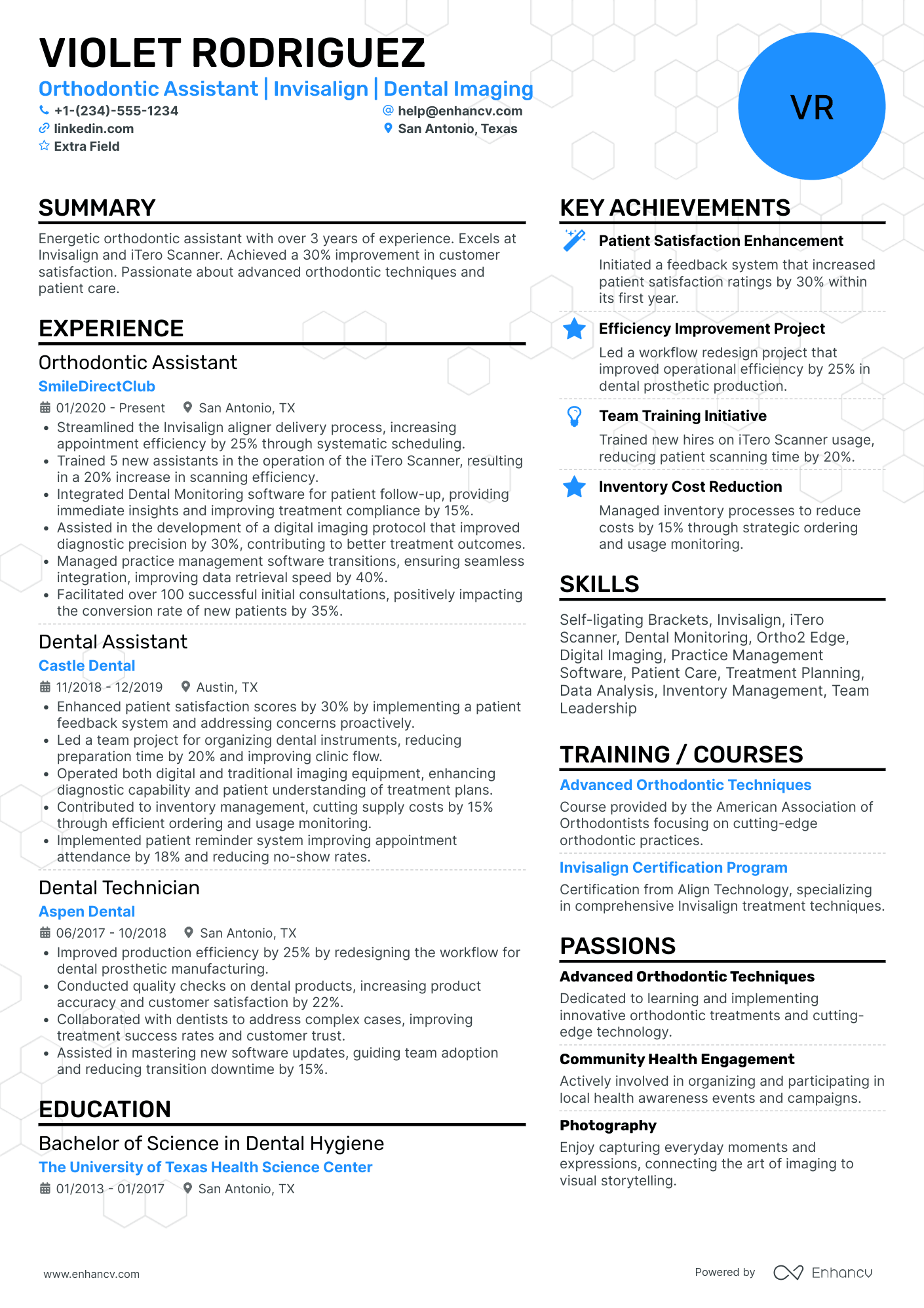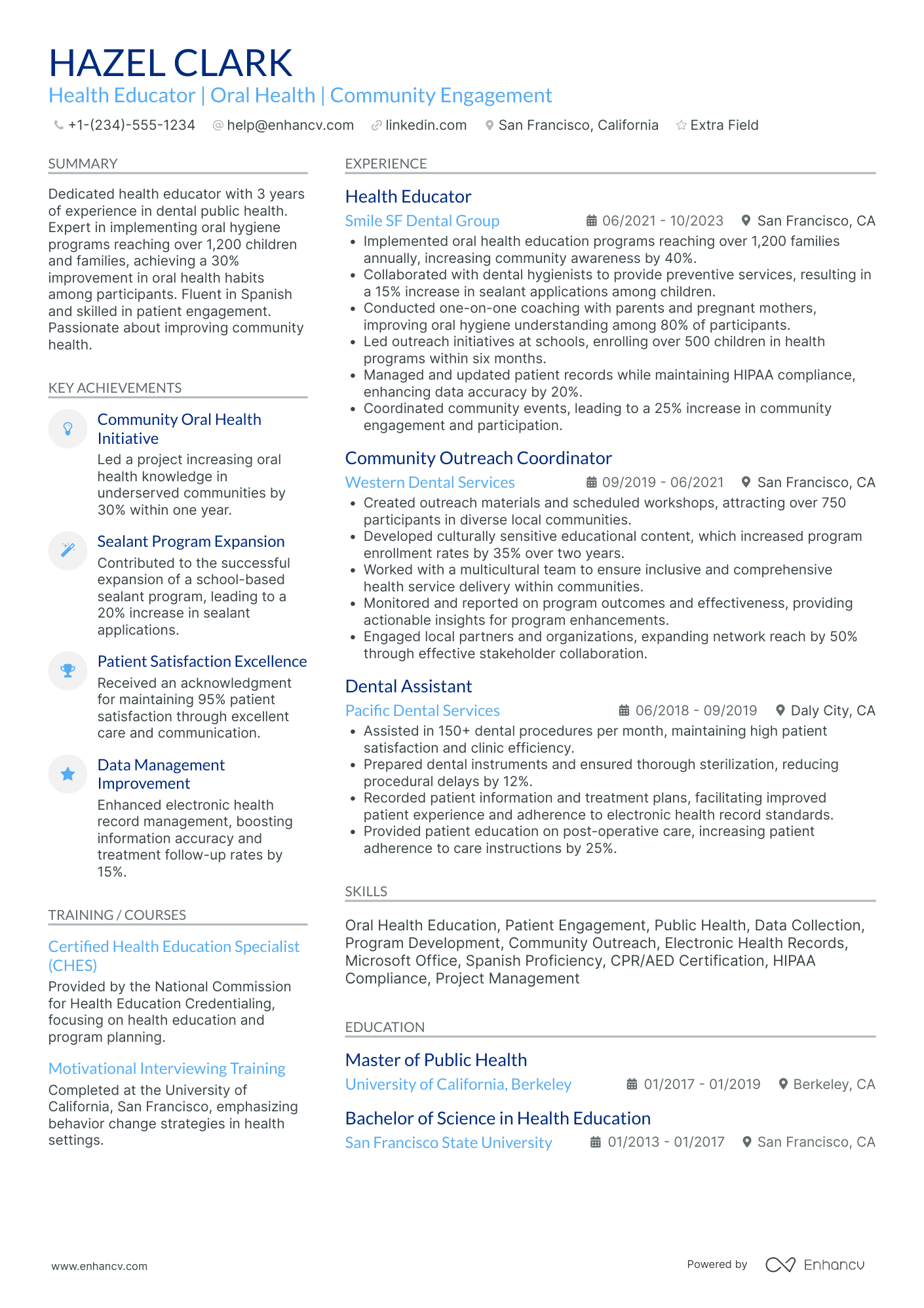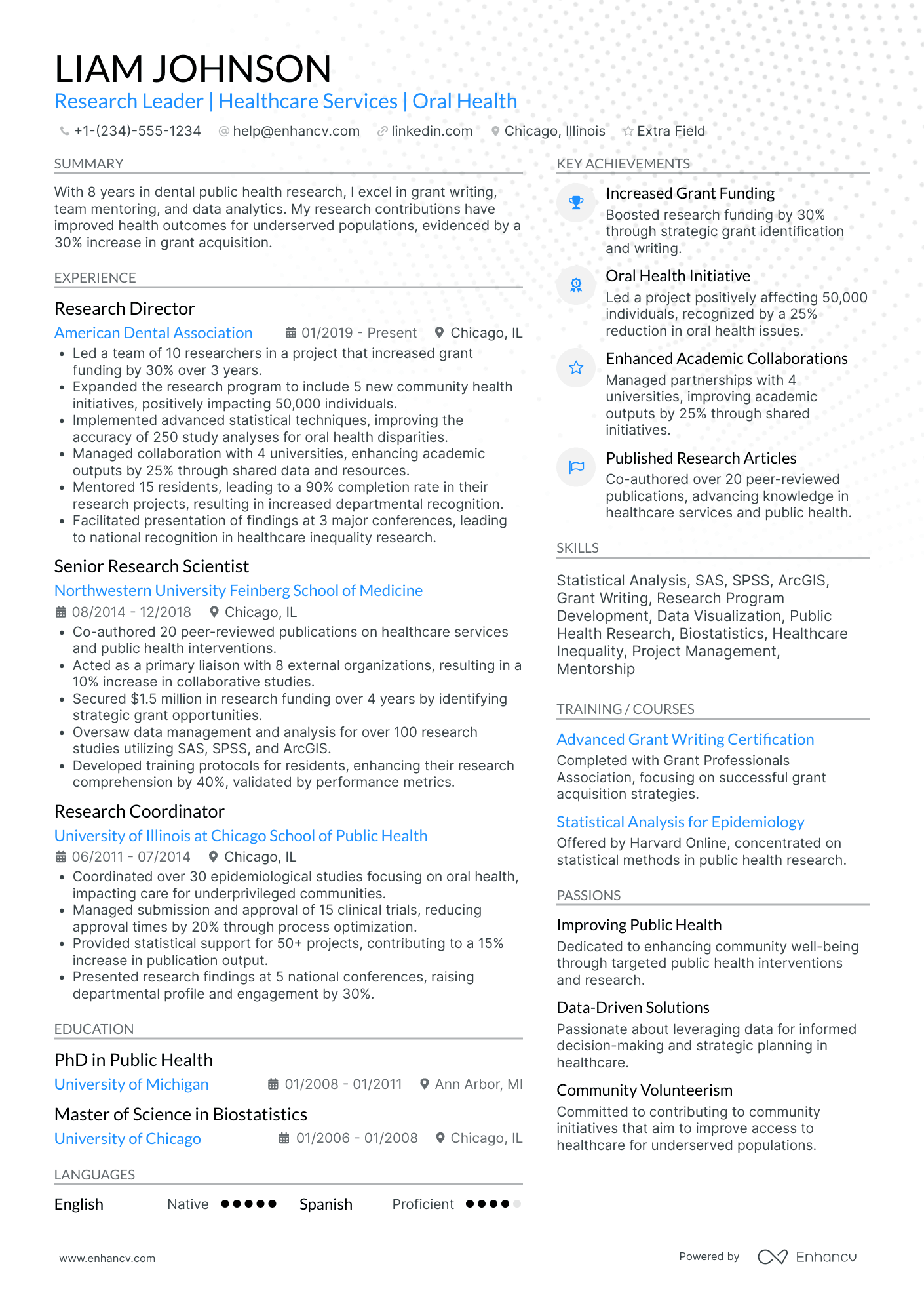Dental hygienists are masters at crafting the perfect dental impression, but when it comes to their resumes, even the most skilled can sometimes falter in making themselves shine on paper.
With more than 200,000 dental hygienists working to brighten smiles across the U.S., having a resume that sparkles is more crucial than ever to stand out from the crowd.
Are you ready to give your dental hygienist resume a glow-up that’s as brilliant as a freshly polished set of pearly whites? Let’s dive into how you can dazzle hiring managers and really sink your teeth into your next career opportunity:
- Balance hard and soft skills. Combining your clinical prowess with your top-notch patient rapport and teamwork abilities. Show employers you're as good with people as you are with a scaler!
- Targeting your resume to the particular job offer by highlighting your most valuable and relevant qualifications. Highlight the skills and experiences that align directly with what they're looking for.
- Improving work experience entries beyond simply describing job duties to enhance their effectiveness.
- Employing quantitative data as evidence of stated skills.
- Utilizing keywords and formatting to improve recognition of well-aligned skills and qualifications.
This resume writing guide, including examples and pro tips, will help you overcome these challenges and ensure that your dental hygienist resume gains attention and makes a flawless impression on prospective employers.
For additional related dental positions, check out the following resume-writing guides:
- Pediatric dental assistant resume
- Orthodontic dental assistant resume
- Certified dental assistant resume
- Dental nurse resume
- Dental hygienist cover letter
How to format a dental hygienist resume
You need more than a bright smile to stand out among the competition for dental hygienist jobs. To get noticed, you’ll need to utilize every possible element of your resume to grab the attention of hiring managers, including your resume's formatting.
Besides ensuring your resume appears polished and professional, it can help or hinder your ability to get noticed by employers.
Dental offices increasingly use Applicant Tracking Systems (ATS) to find qualified hygienists.
ATS analyzes resume text, looking for exact keywords or phrases corresponding to those in a job description. Employers use these systems to quickly sort and prioritize resumes to consider the most qualified candidates.
Review these best practices for ATS-optimized formatting on your dental assistant resume:
- Document type:Doc or PDF files are typical for resumes and most easily analyzed by ATS. PDF files, like those produced using the Enhancv resume builder, are an excellent option for maintaining consistent formatting.
- Creative elements in text: Avoid using nonessential stylistic features within text. Elements such as emojis and non-standard date formats can impede ATS' ability to recognize information in these sections.
Additionally, you’ll want to ensure your resume is well-organized, professional, and memorable by following these formatting best practices:
- Creative elements: Include creative elements, such as colors and decorative designs, to make your resume unique and memorable.
- Header content: A prominent header featuring your name, desired job title, and contact information lets employers view them at a glance.
- Ordering: List all section examples in reverse chronological order to ensure your most recent and relevant appear first.
- Fonts: Select ATS-friendly fonts matching the overall style of your resume, such as Calibri, Arial, and Times New Roman, or for more creative ATS-friendly font options, try Rubik, Lato, Montserrat, Raleway, Exo 2, and Volkhov, which are all available on the Enhancv Resume Builder.
- Headings and subheadings: Ensure resume sections are organized and include simple, precise headings. Standard section titles ensure ATS accurately recognizes and extracts information from these sections.
Different markets have specific resume formats – a Canadian resume could vary in layout.
Is your resume good enough?
Drop your resume here or choose a file. PDF & DOCX only. Max 2MB file size.
To construct a well-organized, professional resume that's optimized for ATS and captures the attention of employers, include the following top-recommended sections:
The top sections on a dental hygienist resume:
- Professional summary: This section should be included to give a brief and engaging overview of your skills and experience tailored towards dental hygiene.
- Education and certifications: It's key for recruiters to verify your qualifications—the completion of an accredited dental hygienist program and required licensure are typically required for these roles.
- Clinical skills and expertise: Include this section to specify your hands-on abilities pertinent to a dental hygienist, such as patient care, equipment sterilization, or dental procedure assistance.
- Work experience: This section establishes your previous experience in dental hygiene or related fields, demonstrating your practical application of skills and knowledge over time.
- References: If appropriate, you can list professional references, ideally from the dental field, who can vouch for your qualifications, work ethic, and suitability for the role.
Additionally, include the following essential information for dental hygienist resumes to ensure your most valuable skills and qualifications are covered.
What recruiters want to see on your resume:
- Licensure: The recruiter will prioritize candidates who are licensed as dental hygienists as regulations mandate this requirement, ensuring they can perform the role legally and safely.
- Experience: Recruiters will consider years and breadth of experience in the field, looking for individuals who have a proven track record in dental hygiene, reducing training time.
- Technical skills: Familiarity with common dental tools and techniques is a priority, ensuring that the candidate can deliver high-quality dental care from day one.
- Patient care skills: Recruiters prioritize hygienists who have excellent patient care skills including empathy, communication, and comfort management because dental visits can potentially cause anxiety among patients.
- Knowledge of dental health and hygiene: They look for candidates with a strong understanding of dental health issues and prevention, ensuring that dental hygiene education can be provided effectively to patients.
How to write your dental hygienist resume experience
Many dental hygienist duties are pretty standard across dental offices—cleaning, screening, and educating. The experience section transforms these routine tasks into vibrant colors of exceptional achievements that leap off the canvas, capturing the attention and admiration of employers.
Education and certifications verify the ability to complete these essential dental hygienist responsibilities. Therefore, to take full advantage of the potential of the experience section, your descriptions should highlight exceptional achievements you’ve made.
Additionally, the experience section should highlight specialized skills developed in past roles that fall outside the standard responsibilities of a dental hygienist—for example, billing experience, appointment scheduling, or specialized certifications.
Look at how the following experience example is improved by focusing on exceptional instead of standard descriptions of duties.
- •Perform thorough dental cleanings, including scaling, root planning, and polishing, for patients of all ages.
- •Conduct comprehensive oral examinations, assess patients' oral health, and identify and document any abnormalities or concerns.
- •Administer fluoride treatments and apply dental sealants to prevent cavities and protect patients' teeth.
- •Educate patients on proper oral hygiene techniques, including brushing, flossing, and dietary recommendations for optimal oral health.
This example describes many procedures and duties that are integral to dental hygienists. However, while the applicant clearly understands and can perform the duties of a dental hygienist, it's unclear how effective they have been in the job. To stand out among applicants with the same abilities and experience, they'll need to include specifics clarifying how well they performed these tasks.
Here’s how it should look:
- •Implemented teledentistry initiatives, conducting virtual consultations and follow-ups to enhance access to care and patient outcomes.
- •Mentored and trained new dental hygienists, providing guidance on clinical skills, patient communication, and professional development.
- •Achieved a 95% patient satisfaction rating based on surveys and feedback, demonstrating exceptional communication skills and patient care.
- •Managed a caseload of 500+ patients annually, providing comprehensive dental hygiene services, including cleanings, periodontal treatments, and preventive care.
- •Utilized advanced periodontal therapy techniques, such as laser-assisted scaling and root planing, to effectively treat periodontal disease.
Through the use of action verbs, this applicant not only showcases their initiative but also takes ownership of their accomplishments. Additionally, the quantitative data they provide is a testament to their effectiveness. Similarly, they highlight their specialized skills, particularly in advanced periodontal therapy techniques, developed in their previous work.
The shift in focus, describing exceptional achievements and knowledge, communicates the applicant's capabilities and is likely to stand out to employers.
How to quantify impact on your resume
An excellent way to stand out amongst applicants and boost your resume impact is to include quantifiable data to prove your stated skills and abilities. These are tangible, measurable, or verifiable details that highlight your accomplishments in past jobs.
This excerpt from the experience section above provides an excellent example of incorporating quantifiable evidence.
This candidate not only presents their patient care skills but also provides compelling data demonstrating the significant impact of their skills.
Determining what numbers and statistics may be available and most impactful in the dental field can be challenging. However, there are numerous ways to incorporate it. These are a few additional possibilities for using numbers and data to prove your dental hygienist skills:
- The number of patients you typically treat per day or week shows your ability to manage workload, maintain efficiency, and facilitate effective patient turnover.
- The percentage of patients experiencing improved oral health under your care highlights your efficacy in treating and educating patients.
- The size of a dental care team you have managed or led in a large office demonstrates teamwork and management skills, showing that you can handle administrative responsibilities.
- The number of different types of dental equipment and software you’re proficient in indicates your versatility and competence in handling diverse dental procedures and technologies.
- An account of how many continuous education units or courses you've completed highlights a dedication to the field and continuous improvement.
- The number of oral health conditions you've treated will demonstrate your breadth of knowledge and experience.
- Patient demographic information, such as the age range of patients you've treated, indicates your skills in managing diverse patient populations.
A targeted resume is most effective for dental hygienists, so remember to be selective when incorporating numbers and statistics, only mentioning those relevant to the position you're applying for.
For example, a small dental practice focused on positive patient experience will be more impressed by how your efforts resulted in an increased percentage of patient satisfaction than how many patients you treated daily in a large, fast-paced dental office.
How to write a dental hygienist resume with no work experience
First-time dental hygienists may feel disadvantaged when applying for work among candidates with more extensive work experience. It’s a hands-on profession that requires experience using instruments, performing procedures, and identifying potential concerns. Thankfully, the training and certifications required for the career ensure you have the hands-on experience critical for employers.
When writing your dental hygienist experience section without prior employment in the field, it’s most effective to focus on a practical work history that demonstrates the same keyword skills found in the job description. For example, you can use internships, practical hours, or temp work to demonstrate the hard and soft skills necessary for the job.
Follow these steps to write an experience section highlighting transferable skills:
- Compile a list of keywords from the job description.
- Brainstorm previous employment, educational, or volunteer experiences that showcase the same keyword skills and knowledge from the job description.
- To add credibility, include tangible evidence of these skills, such as certifications, achievements, and quantifiable data.
- Avoid including irrelevant work experiences or outdated experiences.
- List experiences in reverse chronological order to ensure your most recent and relevant examples appear first.
PRO TIP
Don’t worry about explaining or giving details about how your transferable skills align with the job you are applying for in your resume. Your dental hygienist cover letter is an excellent opportunity to detail further how your background makes you the ideal candidate.
How to list your hard skills and soft skills on your resume
Crafting a standout dental hygienist's resume involves a delicate dance, seamlessly blending technical prowess with the artistry of patient care and communication.
A skills section allows employers to easily identify what you view as your capabilities. Many applicants focus on technical or hard skills that are critical for the job. However, the soft skills related to patient care, communication, and work ethic set candidates apart.
Soft skills can generally be incorporated into various sections of your resume such as in experience descriptions and and personal statements.
Hard skills
Hard skills are the skills necessary to perform a particular job. They require study, training, and practice. In the dental field, hard skills often require certification and reflect technical abilities, like using office software and dental equipment or performing dental procedures.
When crafting your dental hygienist resume, it's crucial to include the hard skills that employers in the field are actively seeking. To ensure you're on the right track, consult this comprehensive list of top sought-after hard skills:
Best hard skills for your dental hygienist resume
- Dental X-ray technology
- Patient education
- Periodontal therapy
- Local anesthesia administration
- Ultrasonic instrumentation
- Hand scaling technique
- Dental mold taking
- Teeth cleaning and polishing
- Hand-eye coordination
- Dental charting skills
- Caries prevention techniques
- Sealant application
- Fluoride application
- Expertise in dental software (Dentrix or Eaglesoft)
- Knowledge of sterile techniques
- Infection control
- Dental health assessment
- Oral cancer screening
- Periodontal disease management
- Radiographic interpretation
- Prophylactic treatment application
Soft skills
Soft skills are intrinsic, personal skills demonstrating the kind of employee you'll be. In a dental office, these skills enable you to provide excellent patient care and satisfaction, for example, compassion, empathy, and active listening are highly valued in any dental office.
While many applicants will have similar technical skills, their soft skills differentiate them and make them stand out to employers. For example, a dental office specializing in pediatric dentistry will value an applicant who mentions soft skills such as patience, compassion, and dedication to patient education in their soft skills section.
Including some of these top soft skills for dental hygienists will help your resume get noticed:
Best soft skills for your dental hygienist resume
- Verbal communication
- Interpersonal skills
- Listening skills
- Empathy
- Detail-oriented
- Patience
- Work under pressure
- Time management
- Responsibility
- Empathy
- Motivation
- Adaptability
- Problem-solving skills
- Critical thinking
- Responsiveness
- Team player
- Professional demeanor
- Comforting attitude
- Positivity
- Good hand-eye coordination
The skills an employer values most will depend on many factors, such as the size of the office, patient demographics, number of employees, and dental specialty. Therefore, targeting your skills to the desired position is more effective.
Follow these steps to write your dental hygienist resume's skills sections:
- Format your skills section as a simple list without elaboration or examples.
- Target your skills section using keyword skills directly from the job description.
- Write these keyword skills precisely as they appear in the job description to enhance ATS analysis.
- Never lie about or exaggerate your skills on your resume.
How to list your certifications and education on your resume
Highlighting your dental hygienist licensing and education is not just crucial—it's your chance to unveil a treasure trove of expertise. Dive deeper by showcasing additional relevant knowledge and specialized certifications, like a Local Anesthesia Certification, turning your resume into a gold mine of qualifications.
The education section of your resume should feature your completed accredited dental hygiene program. You can also include any applicable university degree programs.
Your certifications section should feature state licensure and additional relevant certifications, including continuing education courses required to maintain licensing.
As in other sections of your dental hygienist resume, best practice is to target these sections by limiting entries to those directly related to the position or explicitly requested in the job description.
To write your dental hygienist certification section and education section, follow these steps:
- Create separate sections titled “Education” and “Certifications” to allow ATS to parse information from your resume accurately.
- List all degrees and certifications in reverse chronological order, putting your most recent and relevant entries at the top.
- Keep it organized and straightforward to ensure employers can breeze through your credentials and recognize your value at a glance.
Education-specific best practices:
- For each education item, include the name of the accredited institution, its location, the dates you attended, and the program or degree title.
- Relevant continuing education courses, like those required for state licensing, may be listed in the education section.
- Including your GPA is optional unless the job description requires it.
- In descriptions, brief statements about relevant exceptional coursework achievements such as those achieved in dental anatomy, radiography, pharmacology, periodontology, oral pathology courses, and during clinical practice.
Here’s an example of an excellent education example:
- •Relevant coursework: Dental Anatomy, Oral Pathology, Periodontology, Pharmacology, Dental Radiography
- •Clinical Experience: Completed 500+ hours of supervised clinical training, providing comprehensive dental hygiene services under the guidance of licensed dental professionals.
- •Professional Development: Participated in 15 seminars and workshops on advanced dental hygiene techniques, infection control, and patient communication.
This applicant does an excellent job including all vital education information. Additionally, they include quantitative data and keyword terms to highlight their top qualifications.
Certification-specific best practices:
- Include the name of the certification, the certifying institution, and the year obtained.
- Limit certifications to current, unexpired credentials.
- For certifications requiring renewal, include the date first acquired as well as the most recent renewal or a "valid through" date. For certifications you have held long-term, this demonstrates soft skills such as organization and responsibility.
- Limit your certifications to only those specifically named or directly related to the required skills mentioned in the job description.
The following are a few of the top certifications that stand out to employers hiring dental hygienists:
Best certifications for your dental hygienist resume
How to write your dental hygienist resume summary or objective
Many aspects of a dental hygienist resume are prescribed or standard among applicants. However, a well-written summary or objective statement lets you personalize your resume by highlighting personal achievements and career goals that appeal to employers.
These Personal statements are crucial in garnering the attention of potential employers.
Regardless of which personal statement you select, it should clarify how your experiences and qualifications make you the most suitable candidate for the job.
PRO TIP
Rephrasing specifics from the “Qualifications” or “Ideal Candidate” sections of a job description is a great way to guarantee you mention the skills and qualifications most valued by the employer.
A summary statement focuses on your past work experience and how it aligns with the current job offering. On the other hand, an objective statement focuses on your future career goals to illustrate how they correspond with the position.
Follow these best practices when writing either a summary or an objective:
- Customize the statement to match the specific job you're applying for, emphasizing relevant skills and experiences.
- Start sentences with action verbs to make your summary dynamic and impactful.
- Be brief. A summary should only be 3-5 sentences.
Resume summary
A summary is preferable for most dental hygienists since they’ll have at least some clinical experience. It should highlight how your past success indicates your potential to succeed in the available position.
To write a summary for your dental hygienist resume, follow these best practices:
- Highlight your most relevant skills or experiences that directly overlap with the job description.
- Briefly mention your years of experience to provide context for your level of expertise.
- Write an impactful summary using keywords directly from the job description, highlighting your well-aligned keyword experiences and skills.
- Use details such as naming specific software, dental equipment, procedures, and certifications to reinforce the relevance of your experiences.
- Convey your enthusiasm for the opportunity to continue providing high-quality patient care in the dental field.
A common mistake is writing an overly general dental hygienist summary statement. Let me illustrate:
This applicant follows many of the recommended best practices for writing a summary statement. However, they fail to target it to a particular position. This results in an overly generic statement that misses opportunities to include quantitative data and keywords from the job description which decreases its likelihood to impact potential employers.
Here’s the improved version:
The applicant significantly improves their statement by targeting it to a position in a pediatric dental office. They focus on skills and abilities particularly desirable in an office working with children, including patient education and cavity prevention techniques tailored to young patients. By concentrating on specific experiences in the specialty, they’re sure to draw the attention of any pediatric dentistry office.
Objective statement
An objective section is a better option for dental hygienists with limited experience or who are applying for their first job. It allows you to focus on how you plan to use your background to achieve career goals while contributing to the success of the office.
To write your dental hygienist resume objective, follow these best practices:
- Describe the type of position you’re seeking.
- Share relevant or transferable skills that will help you succeed in the position using keywords directly from the job description.
- Clearly state your career goals and enthusiasm for working towards them in the role.
- Highlight valuable contributions you can make while learning and gaining experience.
- Avoid generic phrases. Instead, focus on specific skills and goals that set you apart.
Optimize your resume summary and objective for ATS
Drop your resume here or choose a file.
PDF & DOCX only. Max 2MB file size.
Additional sections for a dental hygienist resume
Numerous skills and abilities make your dental hygienist resume unique among candidates with similar licensing and work experience. The key is to personalize your resume and highlight exceptional qualifications that make you well-suited for a specific role.
One way to accomplish this is to include one or more of these optional additions for your application in addition to the top-resume sections.
Consider adding one or more of these resume sections to highlight specific qualifications or accomplishments:
- Languages: Excellent patient communication is a cornerstone of patient care. Therefore, being multilingual is a valuable asset in patient-centric environments. Including a language section is an effective way to set yourself apart.
- Achievements and awards: If you’ve received recognition for your work in the past, consider including an awards and achievements section as evidence to support your stated soft skills. In addition to individual awards, you can include awards your office received, such as being voted the top dental facility in your community.
- Professional associations: A professional associations section highlights your dedication to ongoing improvement and staying current in dentistry. Consider joining one of the leading professional associations for dental hygienists below.
Professional associations for dental hygienists
Individualizing your resume with tailored sections ensures it reflects all your top qualifications and stands out among other applicants. Should you include sections other than those above, be sure they use catchy, ATS-friendly headings.
Including specialization on a dental hygienist resume
If you have extensive experience or certifications in a particular dental specialty, such as orthodontic or geriatric dental hygiene, including a specialization section is an ideal way to highlight these qualifications.
Your dental hygienist specialization section should include the following:
- The title of your dental hygienist specialization
- Relevant training or certifications
- Technical skills related to using software and equipment
- Skills and expertise in performing specialized dental procedures
- Soft skills like patience and communication are vital when working with children in a pediatric dental specialty
Here’s an example of how your specialization section should appear on your resume:
Only include a specialization section demonstrating extensive knowledge, skills, and qualifications if applicable to the available dental hygienist position. For instance, the example above would be relevant for an orthodontic office.
However, it isn't appropriate as a separate section for work in a general dentistry office. In this case, the qualifications may be mentioned in the other resume sections, such as the experience section, to demonstrate your capacity to learn specialized skills.
Key takeaways
Creating an impactful dental hygienist resume is vital to standing out among many applicants. To ensure your dental hygienist resume captures the interest of potential employers, remember these key takeaways.
- ATS-optimized formatting helps your resume stand out in a sea of qualified applicants.
- Experience descriptions should highlight exceptional achievements in prior jobs.
- Your resume's skills section should include a tailored list of soft skills along with technical, and hard skills.
- Showcase licensing and ongoing education accomplishments in the certifications and education section.
- Additional sections, such as a specialization section, help highlight your suitability for a particular job opening.
Dental Hygienist resume examples
By Experience
Lead Dental Hygienist
Junior Dental Hygienist
Senior Dental Hygienist
Entry-Level Dental Hygienist
By Role
